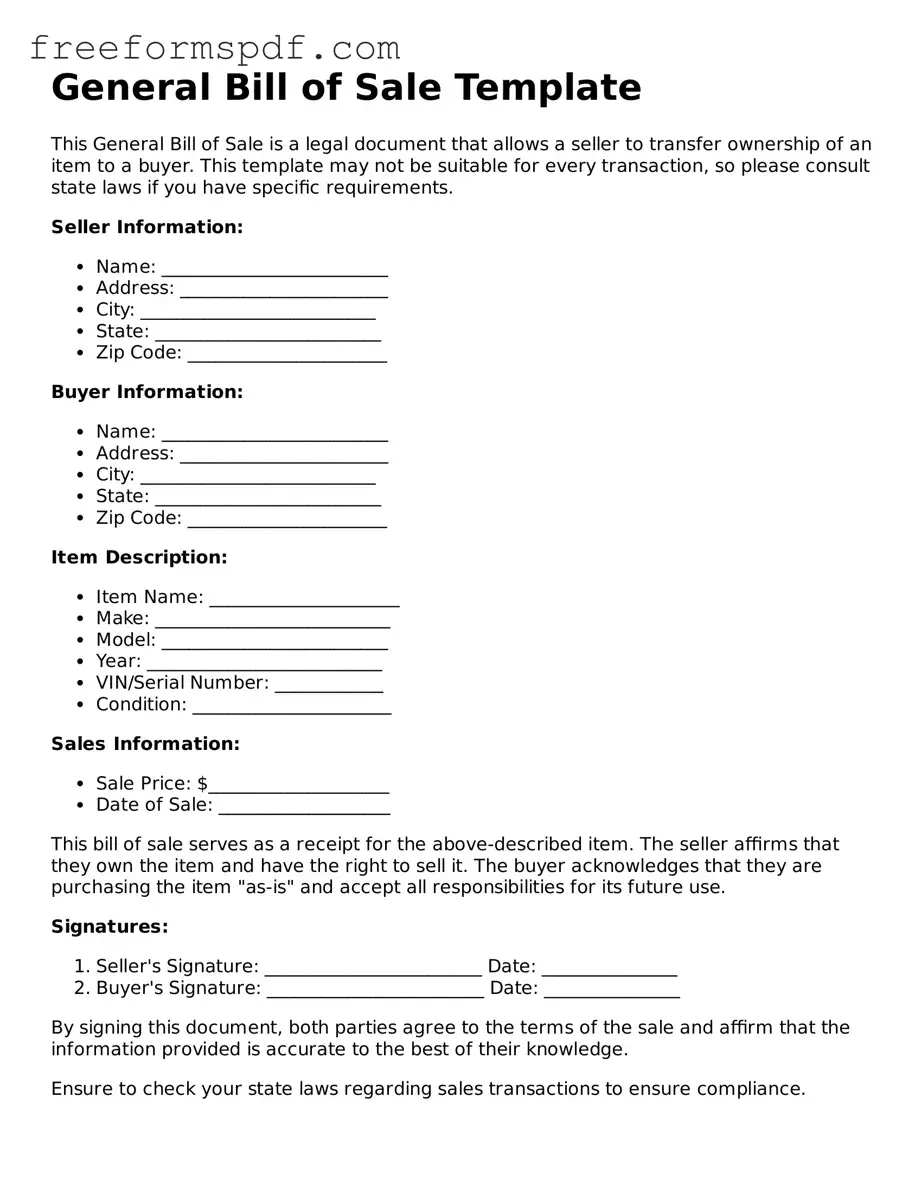General Bill of Sale Document
Common mistakes
-
Incorrect Information: Many people fail to provide accurate details about the buyer and seller. This includes names, addresses, and contact information. Double-checking this information can prevent future disputes.
-
Missing Signatures: A common mistake is neglecting to sign the document. Both the buyer and seller must sign the bill of sale for it to be legally binding. Without signatures, the document holds no value.
-
Incomplete Description of the Item: Some individuals do not provide enough detail about the item being sold. It's important to include specifics such as make, model, year, and condition. A clear description helps avoid misunderstandings.
-
Not Including Payment Terms: Failing to outline payment terms can lead to confusion. Specify the amount, payment method, and any other relevant terms. This clarity protects both parties involved in the transaction.
Learn More on This Form
-
What is a General Bill of Sale?
A General Bill of Sale is a legal document that records the transfer of ownership of personal property from one party to another. This document typically includes details about the buyer, seller, and the item being sold, such as its description, condition, and sale price.
-
Why do I need a General Bill of Sale?
A General Bill of Sale provides proof of the transaction. It protects both the buyer and seller by documenting the sale details, which can be useful for future reference, tax purposes, or if any disputes arise. It serves as a receipt for the buyer and a record of the sale for the seller.
-
What information should be included in a General Bill of Sale?
Essential information includes:
- The names and addresses of both the buyer and seller.
- A description of the item being sold, including make, model, and serial number if applicable.
- The sale price of the item.
- The date of the transaction.
- Signatures of both parties.
-
Is a General Bill of Sale required by law?
While a General Bill of Sale is not always legally required, it is highly recommended for significant transactions. Some states may require a bill of sale for specific items, such as vehicles or firearms. Always check local laws to ensure compliance.
-
Can I create my own General Bill of Sale?
Yes, you can create your own General Bill of Sale. Many templates are available online, or you can draft one from scratch. Ensure that it includes all necessary information and is signed by both parties to make it valid.
-
What should I do if there is a dispute after the sale?
If a dispute arises, the General Bill of Sale can serve as evidence of the transaction. Review the document for details about the sale. If necessary, consider seeking legal advice to resolve the issue, especially if it involves significant financial implications.
Misconceptions
The General Bill of Sale form is a commonly used document in the United States, particularly in transactions involving the sale of personal property. However, several misconceptions surround its use and implications. Below are ten of these misconceptions explained.
-
A Bill of Sale is only necessary for vehicle transactions.
This is incorrect. While a Bill of Sale is often associated with vehicle sales, it can be used for various personal property transactions, including furniture, electronics, and equipment.
-
A Bill of Sale serves as a title transfer.
This is a misunderstanding. A Bill of Sale documents the sale but does not transfer ownership in the same way a title does. Titles are required for certain assets, like vehicles.
-
All states have the same Bill of Sale requirements.
This is false. Each state has its own laws regarding Bill of Sale forms, including what information must be included and whether notarization is required.
-
A Bill of Sale is only needed for high-value items.
This is misleading. Even low-value items can benefit from a Bill of Sale, as it provides proof of the transaction and can help resolve disputes.
-
A verbal agreement is sufficient without a Bill of Sale.
This is not advisable. While verbal agreements can be legally binding, they are difficult to prove. A Bill of Sale provides written evidence of the terms agreed upon.
-
A Bill of Sale protects the seller only.
This is incorrect. A Bill of Sale protects both parties by documenting the transaction details, which can help in case of disputes.
-
You cannot use a Bill of Sale for gifted items.
This is a misconception. A Bill of Sale can also be used to document the transfer of ownership for gifted items, providing clarity and proof of the gift.
-
A Bill of Sale is not legally binding.
This is false. A properly executed Bill of Sale is a legally binding document that can be enforced in court, provided it meets the necessary legal requirements.
-
Once signed, a Bill of Sale cannot be changed.
This is misleading. While changes can be made, both parties must agree to and sign any modifications to the original document.
-
A Bill of Sale is only for private sales.
This is incorrect. A Bill of Sale can also be used in transactions involving businesses, providing a clear record of the sale for both parties.
Other Types of General Bill of Sale Forms:
Equine Bill of Sale - Enhances communication between buyers and sellers.
To ensure a smooth transfer of ownership, it's important to utilize the correct documentation, such as the California Motorcycle Bill of Sale form, which you can find more information about on PDF Documents Hub. This document not only solidifies the transaction but also offers protection for both the seller and buyer by clearly outlining the terms of the sale.
Bill of Sale for Rifle - Creates an official record of sale location and date.
Snowmobile Bill of Sale Template - Streamline your snowmobile transactions with this easy-to-use form.
